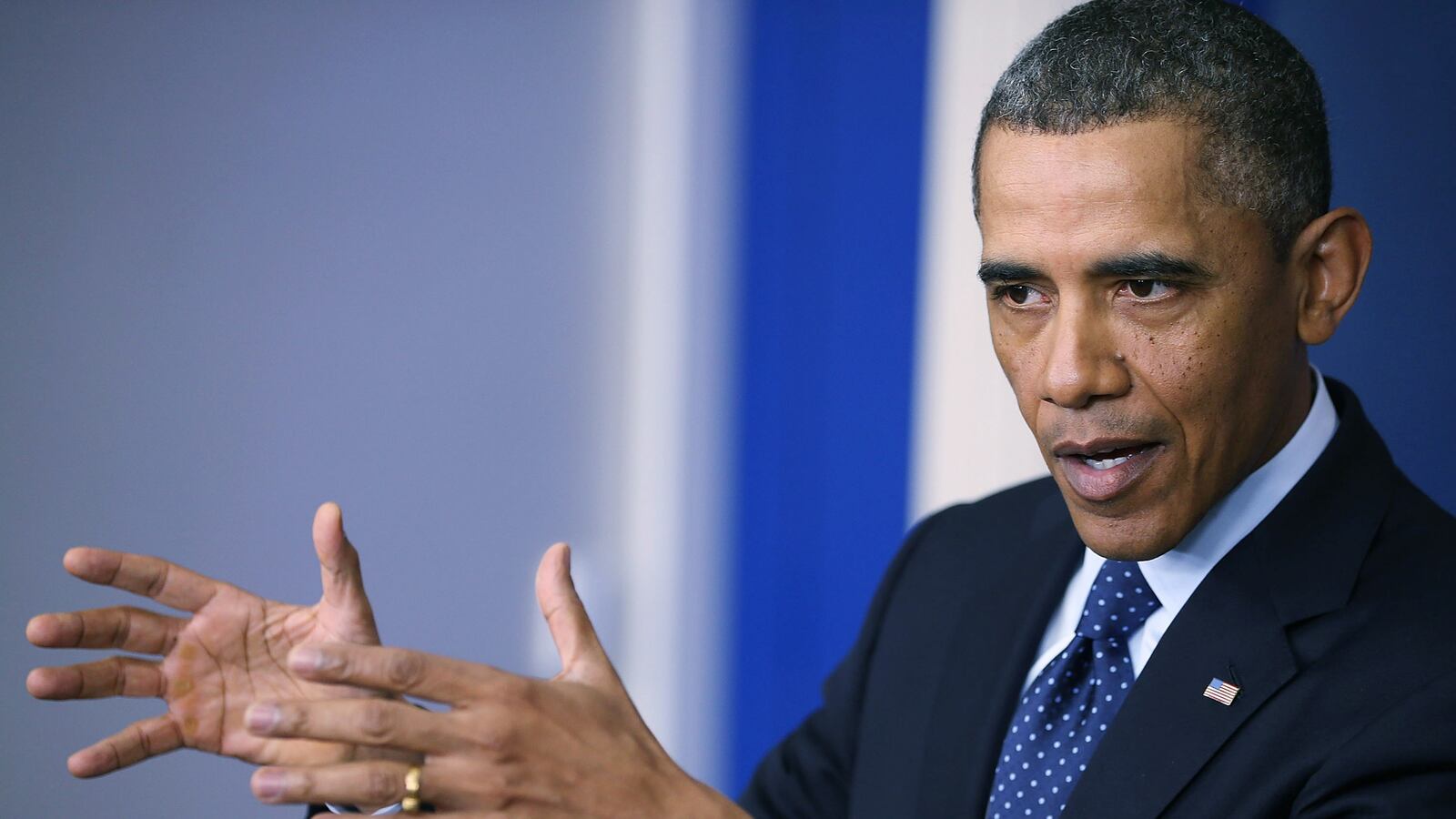After 16 months of anticipation, sequestration cuts kicked in today and President Obama called the leaders of Congress to the White House, prompting a well-deserved chorus of “what the hell took you so long?”

The brief meeting failed to make any dent in the impasse and Speaker John Boehner and Senate Minority Leader Mitch McConnell left the White House after just over an hour, joining their congressional colleagues on a not-at-all-deserved long weekend.
The lack of urgency in Washington this week has been startling but not surprising. An aura of impotence has consumed the government, as deep, across-the-board cuts everyone says they oppose set in. The only action in town has been a public blame game that gives sandbox politics a bad name.
“The Buck Stops Here”—that’s what a famous sign on President Harry Truman’s desk read. But today’s Washington gridlock has resulted in a diffusion of responsibility, with President Obama telling CNN’s Jessica Yellin, “I am not a dictator. I’m the president,” explaining that he can’t have the Secret Service block the door if Boehner and McConnell leave and he doesn’t have the power to have a “Jedi mind meld with these folks and convince them to do what’s right.”
Predictably, the mangled pop-culture reference preoccupied the Twitterverse, but the president’s protest raised a serious question: what is his plan of action? What’s the point of calling a Friday Come to Jesus meeting on the day sequestration kicks in, while Congress has already high-tailed it home?
Let’s start by giving President Obama the benefit of the doubt—namely that there is a strategy in place. If so, the president is playing a long game, knowing that the sequester cuts are just the first of a series of fiscal cliffs the country is scheduled to face this spring, with the government set to need a continuing resolution at the end of March to avoid shutdown and a debt-ceiling collision set for mid-May.
In other words, by letting the reality of the unpopular sequester cuts start to set in, the president hopes that he can finally pass a grand bargain this spring and stop this stupid cycle of governing by crisis.
It is a dangerous game. While polls show Americans more likely to blame Republicans for the obstructive gridlock than the president, if the economy turns south and chaos continues to reign supreme, ultimately people will blame the president. There are no doubt some conservative strategists counseling a hard-line betting on this outcome with an eye toward the 2014 and 2016 elections.
But the president is backing up his call for a balanced deficit-and-debt reduction with specifics that credibly show a willingness to take on the base of his own party to achieve a deal. In a document released again under wh.gov/jedimindmeld, the White House lays out specific entitlement reforms it says the president offered Boehner in past negotiations that remain on the table. The proposals include overhauling Social Security through chained CPI (estimated to save some $130 billion) and more means testing for Medicare. These proposals infuriate liberal congressmen and activist groups, who are already rallying to oppose any benefit cuts under a Grover Norquist-like pledge pushed by Congressmen Alan Grayson and Mark Takano.
So the president has some credibility when he says he’s willing to put forward a plan with elements that liberals in his party would oppose. The question is whether Republicans will back closing further tax loopholes—without raising actual tax rates—as a way of increasing revenue to pay down the debt. Even John Boehner will privately acknowledge that his 50 or so House radicals are an impediment to governing—hence the repeated ditching of the Hastert Rule to get legislation passed.
The president used to be known as a poker player back in Illinois and he’s been fascinated by the presidency of another poker player, Dwight Eisenhower, in recent months. Evan Thomas’s recent book, Ike’s Bluff, uses the lens of that game to illustrate Ike’s approach to the office and his Cold War negotiations with the Soviets. At stake now is not nuclear Armageddon, but the overall health of the American economy.
The opening bluff in this game has already been called—the economy will not implode next week due to the sequester cuts. But the effects will be real and will accelerate in April. At that point, we’ll get a better sense of which team is bluffing and how much pressure they can withstand. Defense contractors will be among the first to enact cutbacks and that will add pressure on Republicans. But the pain will be real in forgotten communities as well, and as the president admitted “the accumulation of all those stories of impact is going to make our economy weaker. It’s going to mean less growth. It’s going to mean hundreds of thousands of jobs lost. That is real … That’s not a scare tactic. That’s a fact.”
This dangerous game of high-stakes political poker will continue all month long, through the continuing resolution and possibly through the spring debt-ceiling threshold that got us into this sequester mess in the first place.
Because of the polarization of the parties in Congress, divided government is now dysfunctional government. There are forces in both parties arguing against any compromise, instead arguing to wait for the next election, despite the fact that the last election was just six months ago. These ideological opponents of cooperative action are the enemies of a grand bargain, ironically the greatest obstacle to a real plan to deal with the deficit and the debt.
So while our Washington “leaders” engage in their high-stakes game, citizens will pay the cost. It’s a pointed reminder that this isn’t a game at all. It’s our country.





